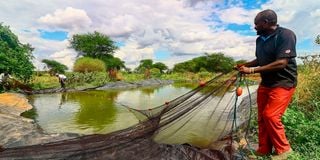With droughts ravaging cattle, Kajiado embraces fish farming

Isaac Samperu, a farmer at Oldonyo Orok in Kajiado Central, harvests fish on March 23, 2024.
What you need to know:
- In Imutaitin village, Judith Kuntai practices fish pond farming.
- The teacher advocates for farming and rainwater harvesting.
The net catches different sizes of tilapia. The fishermen identify the mature ones and place them in a container of clean cold water before releasing the rest back to the pond.
This is Imutaitin village in Kajiado Central sub-county.
Judith Kuntai, who practices fish pond farming, has also mastered the skill of removing scales and intestines of the tilapia before distributing to customers.
She keeps some for her household.
“When in school, I was told to transform society. I ventured into farming because of its economic significance,” the primary school deputy headteacher says.
The pond occupies a quarter-hectare, with two fences around it.
The project started by Kuntai in 2021 has survived the longest drought witnessed in Kajiado.

Judith Kuntai, a deputy head teacher and fish farmer at her home in Kajiado County on March 23, 2024.
“Our borehole dried. It was very expensive to maintain the right volume of water in the pond at the time,” the mother of three says.
El Nino rains from November 2023 to May this year were a relief for Kuntai.
“I have not spent money on water from the time it began raining. Evaporation is less after temperatures fell. My maize and vegetables are also thriving,” she says.
The teacher encourages her community to embrace fish farming and rainwater harvesting. She belongs to three women groups.
“The heavy rains have boosted our fish production. Our dam is full of water that will be used during dry spells. We harvested rainwater in several tanks,” Kuntai says.
There is increased demand for protein as population grows. With global warming, scientists say fish pond farming will help fight hunger.
Kuntai appreciates the ripple effects of fish farming in dry Kajiado County.
“Many of our cows, goats and sheep die as we move them during droughts. There are also quarrels when animals move from one homestead to another. We’ve overcome these challenges with fish farming,” she says.
Isaac Samperu is another fish pond farmer in Matapato South ward. The father to three got into the venture after realising he could turn a reservoir he had been using into a pond.
“During drought, crop and animal production was tough as farmers competed for water. The fish pond and vegetables also needed water. The heavy rains came as a blessing,” he says.
“The circulation of water has improved too. The water that I pump into the farm from the pond contains nitrogen, phosphorus and other minerals important for my crops.”
Shortly after the fish are fed, they produce waste. The fish also do not eat all the feed given to them.
The remains stay in water, which is recycled through irrigation.
Samperu is happy to contribute to the war on hunger in Kajiado County.
“I get money from this enterprise and the fish is used as food by the community,” says the Multimedia University of Kenya alumnae who holds an Advanced Diploma in Management Information Systems.
Samperu’s tilapia pond is 20 by 10 metres and has more than 1,000 fingerlings. At least 200 adult fish are mature enough to be harvested.
He harvests tilapia two times a year and hopes to build another pond soon.
“My biggest problem is getting feed. Nairobi is very far but that is the only place I get good feed. A 25kg bag is Sh3800,” he says.

Jerimiah Ongeri (left) and Wilson Meiliare cast a net to harvest fish from a pond in Kajiado Central on March 23, 2024.
Japhet Kaadzo Tembo, an aquaculture expert, says the quality of feed affects the growth duration and size of fish.
“Fish should mature in there to four months after hatching. Because getting the right feed and protein is a challenge, the period in many farms extends to six to seven months.
“You must feed your fish well and create the right conditions for them to grow,” Tembo says.
Families displaced by the Boko Haram conflict in Nigeria have resorted to fish pond farming.
“Northeastern Nigeria is on the fringes of Sahara Desert where it rains for 90 days a year. The most important thing there is to have a reliable source of water in a secure location,” says Jasper Mwesigwa, head of the FAO Nigeria Food Security Analysis Unit.





